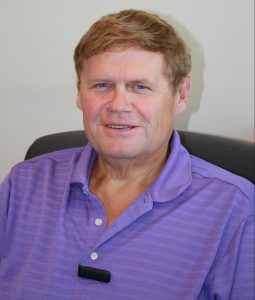Psychology Professor Selected as IEEE Fellow

Peter Hancock, Ph.D., a UCF Psychology Pegasus Professor and University Trustee Chair, has been named an Institute of Electrical and Electronics Engineers Fellow.
His appointment, beginning January 2017, is in recognition of his contributions to adaptive human-systems engineering.
Adaptive human-systems use direct information from on-line brain physiological monitoring. The systems adjust and adapt their operations to improve unaided individuals’ ability. These systems are employed in many dimensions of everyday life and exert significant effects on the design of almost all computer-based technological innovations.
Hancock has applied adaptive human-systems engineering to military systems as well as other fields. Currently, Hancock and his graduate students are developing robotics for aiding physically disabled individuals.
IEEE Fellows, selected by the IEEE board of directors, must have an outstanding record of accomplishments in any of the IEEE fields of interest.
The selection process is highly competitive, with scholars selected worldwide. IEEE Fellow is the highest grade of membership and is recognized by the technical community as a prestigious honor and an important career achievement.
Hancock pioneered the use of physiological and neuro-physiologically based adaptive human-machine systems. These systems use information derived from brain and body to regulate interactions between users and their technologies.
These systems can be used to replace damaged capacities to interact, regulate on-going information exchange rate, and even augment and improve human physical and cognitive capacities.
Hancock was also awarded the Leland S. Kollmorgen Spirit of Innovation Award from the Augmented Cognition Society, for these foundational contributions.
Receiving his doctorate from the University of Illinois, Hancock also worked at the University of Southern California and the University of Minnesota prior to moving to UCF. He is affiliated with multiple universities and institutions.
“I am extremely honored at being named Fellow in IEEE,” Hancock said. “Not only does it attest to the growing interdisciplinary nature of all of engineering, I feel it is also a direct recognition of the importance of human-centered engineered systems. So, while I am personally very gratified by this honor, my hope is that it is representative of a thrust that puts people at the heart of all of our modern, technical environments.”
The IEEE is the world’s leading professional association for advancing technology for humanity. Through its 400,000 plus members in 160 countries, the association is a leading authority on a wide variety of areas ranging from aerospace systems, computers and telecommunications to biomedical engineering, electric power and consumer electronics.
“Dr. Hancock is one of our most distinguished scholars, a leading authority in human factors psychology,” said Michael Johnson, dean of the College of Sciences. “This recognition from IEEE adds to a long list of well-deserved honors.”
